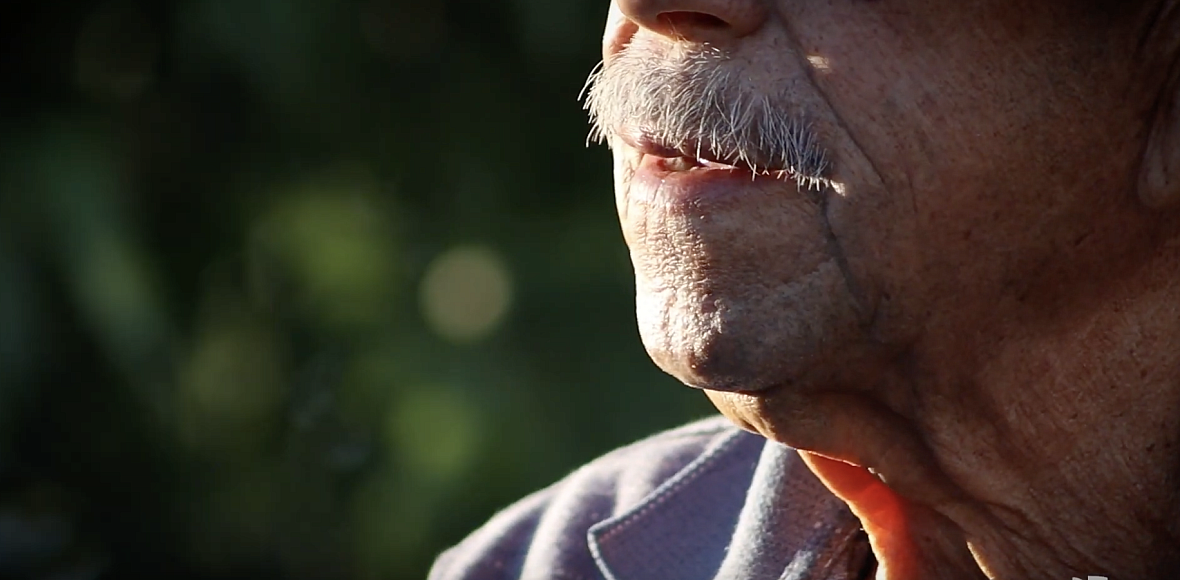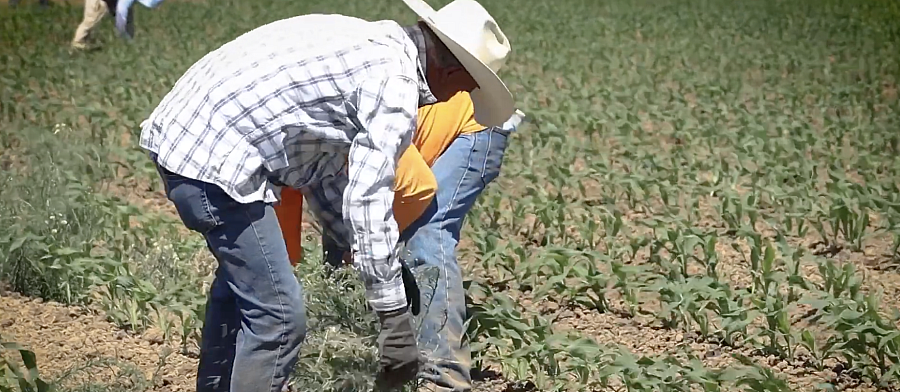Aging Latino Farmworkers Say They Cannot Afford to Retire
The story was co-published with Univision 19 as part of the 2024 Ethnic Media Collaborative, Healing California.

As they age, farmworkers keep working while facing greater medical needs.
Univision 19
Andrea: In these fields, the hands that harvest the fruits feeding our country are aging
Nats
Rashel: These are immigrants who have worked for decades, many of whom have already reached retirement age.
Nats
Andrea: We visited three harvests, and in each one, we found people who have spent their lives working and still have no plans to hang up their gloves.
[soundbite/Felipe]
"when it’s time for tomato, corn, grape pruning, almond pruning, cherry... Everything that’s in the field. We're helping the country move forward, making sure there's food on the table."
Rashel: At 64 years old, felipe works eight hours a day or more, often under 100-degree heat, bending down, cutting, and picking the crops assigned to him each day.
Nats
According to the social security administration, the retirement age for those born in 1960 and after is 67. Felipe, who is only three years away from that age, has no plans to retire soon.
[soundbite/felipe]
"I know people who have retired, but their income isn’t enough. What do they do? They keep working.
Rashel: Is that common?"
"well, yes."
Andrea: He is one of the most experienced and oldest workers in this crew. His biggest fear isn’t continuing to work, but rather not finding work.
[soundbite/Felipe]
"They see you’re older, and even if you know the job well, they go for the younger one. Maybe you’re a good worker, but you're older."
Rashel: In another field, Evaristo is clearing weeds from a tomato crop in the central valley.
Nats
[soundbite/Evaristo]
"How old were you when you started working in the fields?"
"In mexico, I started at 12 years old."
Andrea: Now, at 62 years old, he also has no plans to retire.
[soundbite/evaristo]
"Do you plan to retire?"
"Well, let’s see if i get the chance..."
Andrea: A study by the university of california, merced, found that the average profile of the farmworker has changed over the years. Today, the majority are older, undocumented immigrants.
In 1979, the average age of farmworkers was 30 years. By 2019, that average age had risen to 40.
Currently, at least 14,000 farmworkers of retirement age are working without documentation. In the next decade, that number is expected to grow to around 20,000.
[soundbite/Alfredo]
My name is Alfredo, I arrived in '65 to harvest peaches...they paid us 30 cents per box...
Andrea: At 75, Alfredo has spent six decades working in the fields.
[soundbite/alfredo]
"I don’t have money, i don’t have anything, but i have my health."

Senior farmworkers work long hours
Univision 19
Andrea: As farmworkers age, their risk of developing health issues increases significantly, with a 3% to 9% rise in conditions like obesity, hypertension, and high cholesterol for each year of age.
[soundbite/Alfredo]
"They removed my pancreas... I was in a coma... Gallbladder... And here i am..."
andrea: "Because of cancer?"
"Because of cancer and stomach issues... Thank god my daughters never left me..."
These health problems are linked to poor nutrition due to limited access to healthy food, lack of health insurance, exposure to pesticides, extreme heat, and the physical demands of the job.
[soundbite/uc merced]
"They suffer from chronic injuries, even injuries from accidents... At retirement age, they require special medical attention."
Rashel: Additionally, aging brings greater healthcare needs, including cancer screenings and treatment for chronic illnesses.
[soundbite/UC Merced]
"cancer, diabetes... Etc."
Andrea: Despite all of this, Felipe, Evaristo, and Alfredo all agree on one thing: they prefer to keep working.
[soundbite/Alfredo]
"if I stay at home, i don’t feel active. I feel healthier here, both physically and mentally."
But with so many workers in this age range, experts suggest that a wave of forced retirements may be inevitable.
Andrea: With fewer migrant workers and a lack of incentives for young americans to take over, the impact on california's economy is still uncertain.
[soundbite/Dolores Huerta]
"I think it’s a crisis we’ll face in our community. So many people have given their whole lives to this country, contributing through their work, but because they didn’t have documents, they couldn’t receive social security benefits. I don’t know what we’ll have to do..."
Rashel: Since federal law doesn’t allow it, california legislators attempted to pass a law providing benefits—$1,500 for undocumented seniors to retire.
However, governor newsom vetoed the proposal, citing insufficient state funds and pointing out that other initiatives have been implemented for the undocumented community.
Andrea: among them, california is the first state to offer healthcare coverage to undocumented seniors—a benefit appreciated by workers, but which experts argue is insufficient considering how much they’ve contributed to the country and the state.
[soundbite/UC Merced]
"Since many are undocumented, we believe there are very few options... One plan could be a retirement plan provided by unions..."
Proposals remain in the draft stages.
Andrea: Meanwhile, those who contribute to essential tasks continue to give without expecting anything in return.
[soundbite/Felipe]
"we’re helping the country move forward, making sure there’s food on the table."

Rashel: And so, in these fields, giving their lives without receiving much in return, these essential workers will continue...
[soundbite/Alfredo]
"I’ve sent messages to the president and the governor. They need to support these people, hard working people. The ranchers need them, the country needs them, because without people, this country won’t thrive."
Andrea: Knowing that here, with their work, they’ve built a better life for generations of children and grandchildren who now call this country home...
This project was supported by the USC Annenberg Center for Health Journalism, and is part of "Healing California", a yearlong reporting Ethnic Media Collaborative venture with print, online and broadcast outlets across California.

